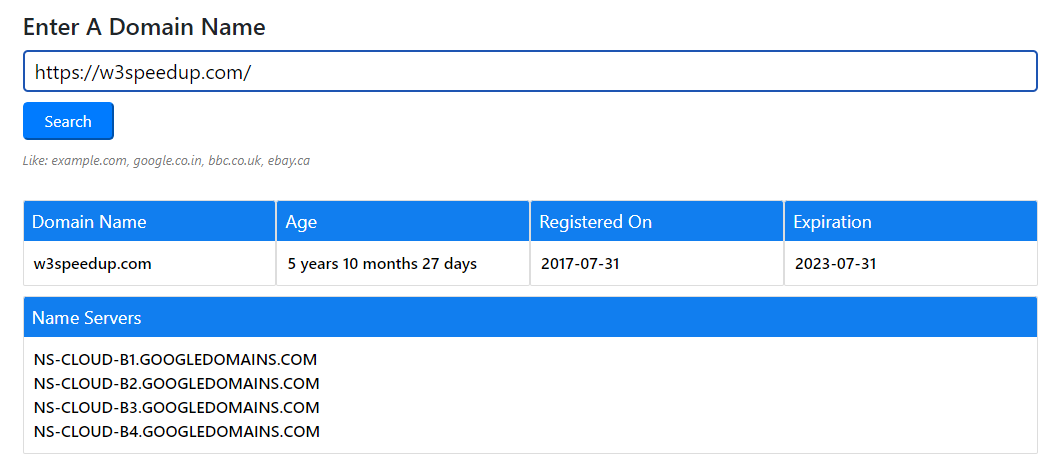Enter A Domain Name
Like: example.com, google.co.in, bbc.co.uk, ebay.ca⯁ Boost Your Website’s Credibility with Website Age Checker: The Ultimate Trust-building Tool!
This service page will delve into the website age and its impact on building credibility. We will introduce the domain age checker tool, exploring its benefits and functionality. Additionally, we will examine the significance of domain names, registration dates, expiration dates, and name servers in the credibility-building process. By the end, you’ll understand how the Website Age Checker can be the ultimate trust-building tool for your website, helping you gain your audience’s confidence and improving your online presence.
⯁ The Significance of Website Age in Building Credibility:
When establishing credibility for your website, the age of your domain plays a crucial role. Website age refers to the time your domain has been registered and launched online. While it may seem like a trivial factor, website age carries substantial weight in the eyes of both users and search engines. Here’s why website age is significant in building credibility:
🠦 Building User Trust
A website that has been around for a considerable period inspires trust and confidence among users. When visitors see that a website has been operating for several years, it creates a sense of stability and reliability. Users are more likely to engage with a website they perceive as established, as it implies a proven track record & a commitment to staying in business.
🠦 Psychological Impact
The age of a website has a psychological impact on users. People often associate longevity with credibility, expertise, and authority. If your website has existed for a significant amount of time, users are more likely to trust the information, products, or services you provide. This psychological association can significantly influence users’ decision-making and increase their willingness to engage with your website.
🠦 Search Engine Rankings
Search engines, such as Google, consider website age as one of the factors in determining search result rankings. Older domains are perceived as more reliable and trustworthy, positively impacting your website’s search engine optimization (SEO) efforts. A well-established website is more likely to have accumulated backlinks, social signals, and a solid online reputation over time, contributing to higher search engine rankings and increased visibility.
🠦 Authority and Expertise
Website age can also contribute to establishing your website as an authority in your industry. The longer your website has been in operation, the more opportunities you have had to create valuable content, build a loyal audience, and establish relationships with industry influencers. This accumulation of knowledge, experience, and relationships enhances your website’s perceived expertise and authority, further strengthening your credibility.
⯁ Introducing the Website Age Checker Tool
To effectively harness the power of website age in building credibility, it’s essential to have access to accurate and reliable information about your website’s age. This is where the domain registration date checker tool comes into play. The Website Age Checker is a valuable online tool that allows you to determine the age of any website by retrieving and analyzing its domain registration data. Here’s an introduction to the domain registration date checker tool and its key benefits:
The domain registration date checker tool is designed to provide insights into a website’s age by examining its domain registration details. By entering the domain name of a website into the tool, you can retrieve essential information related to its registration date, expiration date, and name server checks. This data lets you evaluate the website’s age and verify its credibility.
🠦 Benefits of Using a Website Age Checker
The Website Age Checker offers several advantages for website owners and marketers:
-
- Credibility Assessment
Using the Website Age Checker, you can accurately assess the age of your website or any other website you are interested in. This information allows you to gauge your website’s credibility and make data-driven decisions on enhancing trust and reputation.
-
- Competitor Analysis
The tool enables you to compare the age of your website with that of your competitors. Understanding the relative website ages within your industry can help you identify areas for improvement and develop strategies to differentiate yourself from competitors.
-
- SEO Optimization
Website age is a factor considered by search engines when determining rankings. Using the domain age checker, you can analyze the age of your website and strategize SEO efforts accordingly. You can leverage the data to refine your SEO strategy, optimize your content, and improve your rankings.
-
- Trust-building Strategies
Knowing the age of your website empowers you to incorporate this information into your trust-building strategies. You can highlight your website’s longevity, share milestones, and communicate your experience and expertise to build trust with your audience.
🠦 Understanding the Mechanics
The Website Age Checker tool operates by accessing publicly available domain registration information. It retrieves details such as the date of registration, expiration, and name server check associated with the domain. This data is then analyzed to calculate the website’s age and provide you with accurate information about its credibility.
⯁ Examining Website Age and Trust
The age of a website plays a crucial role in building trust and credibility among users. When users perceive a website as being established and reliable, they are more likely to trust its information, products, or services. Let’s explore the correlation between website age and trust, supported by case studies, statistics, and research:
🠦 Correlation between Website Age and User Trust
Many studies have shown a positive correlation between website age and user trust. Here’s why website age contributes to building trust:
-
- Perception of experience: Users associate website age with experience and expertise. An older website is seen as having more experience in its industry, making users more inclined to trust the content it provides.
-
- Reliability and stability: A website that has been around for a considerable period suggests stability and reliability. Users believe that an established website is less likely to engage in fraudulent or deceptive practices, increasing their trust in the site.
-
- Social proof: Over time, older websites accumulate user reviews, testimonials, and social signals, which serve as social proof. Positive feedback and engagement from other users contribute to building trust among new visitors.
🠦 Case Studies and Research
Several case studies and research have highlighted the impact of website age on trust-building:
-
- A study conducted by Stanford University found that participants perceived websites with longer histories as more trustworthy and reliable. The age of a website was considered a crucial factor in determining credibility.
-
- In a case study, they found that changing the domain of an established website led to a decrease in trust and conversions. Users were more hesitant to engage with a new domain, highlighting the importance of website age in building trust.
-
- Additionally, a well-known SEO software company has listed domain age as one of the search engine ranking factors. This suggests that search engines also recognize the trustworthiness associated with older domains.
🠦 Statistics on Website Age and Credibility
While the impact of website age may vary across industries, some statistics provide insights into the relationship between age and credibility:
According to a survey of HubSpot, 75% of respondents cited an “established online presence” as a crucial factor in determining the credibility of a website.
A Small Business Trends study found that consumers are more likely to trust businesses with a more extended online presence and established websites.
Furthermore, a study by Econsultancy revealed that 94% of respondents claimed that website design influenced their trust in a website, and an older website often exudes a sense of professionalism and trustworthiness through its design and functionality.
⯁ Exploring Name Servers and Credibility
In addition to domain age, another aspect of domain information that can contribute to website credibility is the name servers associated with the domain. Name server check play a vital role in directing and managing a website’s DNS (Domain Name System) settings. Let’s explore how name servers impact credibility and why they are worth considering:
Name servers, or DNS servers, are specialized servers that translate domain names into IP addresses, allowing users to access websites through easy-to-remember domain names instead of numeric IP addresses. They play a critical role in routing web traffic and ensuring the proper functioning of a website.
🠦 How Name Servers Affect Website Credibility
While name servers may not directly impact user perception of credibility, they provide valuable insights and can indirectly influence trust in the following ways:
-
- Consistency and reliability: Using reputable and well-known name servers adds more reliability to your website. Established name server check providers have robust infrastructure and high uptime, ensuring smooth and uninterrupted access to your site. This consistency contributes to user trust in the reliability of your website.
-
- Security and protection: Name servers can play a role in safeguarding your website against security threats such as DDoS attacks or DNS hijacking. Utilizing reputable name servers that prioritize security measures can enhance the overall security of your website, instilling confidence in users that their data and interactions are protected.
-
- Technical competence: Employing professional and reliable name servers demonstrates technical competence and attention to detail. It indicates that you have taken the necessary steps to ensure smooth DNS management, which reflects positively on your website’s credibility.
🠦 Checking Name Server Information for Trust Validation
To assess the credibility of a website’s name servers, you can use domain lookup tools or WHOIS databases to retrieve and analyze the name server information associated with the domain. Look for the following aspects:
-
- Reputable providers: Verify if the name servers used by the website are associated with well-known and respected DNS service providers or hosting companies. Recognizable providers often have a track record of reliable service and security measures.
-
- Uptime and performance: Check if the name servers have a history of high uptime and excellent performance. Look for reports of frequent outages or slow response times, as these factors can impact user experience and credibility.
-
- Security features: Investigate whether the name servers offer additional security features such as DDoS protection, DNSSEC (DNS Security Extensions), or other measures to safeguard against potential threats.
⯁ Steps to Perform a Website Age Check
Performing a website age check involves retrieving and analyzing domain registration information to determine the age of a website. Here are the steps to perform a website age check:

-
- Identify the domain: Start by identifying the domain name of the website for which you want to check the age. The domain name is the web address users type in to access the website (e.g., www.example.com).
-
- Choose a Website Age Checker tool: Several online tools can provide website age information. Choose a reliable and reputable Website Age Checker tool to perform the check.
-
- Visit the Website Age Checker tool: Open your preferred tool in a web browser. You may need to navigate the tool’s website or search for it using a search engines.
-
- Enter the domain name: Once you access the Website Age Checker tool, locate the input field or search bar to enter the domain name. Type or paste the domain name of the website you want to check.
-
- Initiate the check: After entering the domain name, click the “Check” or “Search” button to initiate the website age check process. The tool will retrieve and analyze the domain registration information associated with the provided domain.
-
- Review the results: Once the website age check is complete, the tool will display the relevant information about the domain. This typically includes the registration date, expiration date, and name servers associated with the domain.
-
- Analyze the age information: Examine the registration date to determine the website’s age. Calculate the duration between the registration and current dates to obtain the website’s age in years or months.
-
- Interpret the results: Based on the website’s age, assess its credibility and reputation. Consider the significance of website age in building trust, as discussed earlier in this content, to evaluate the impact of the website’s age on its overall credibility.
⯁ Utilizing Website Age to Enhance Trustworthiness
Utilizing the age of your website strategically can significantly enhance its trustworthiness. Here’s how:
-
- Highlight longevity: Emphasize the number of years your website has been in operation. Displaying this information prominently on your website can establish a sense of reliability and expertise, making users more likely to trust your content or offerings.
-
- Showcase milestones: Share significant milestones or achievements your website has reached over time. This could include testimonials, awards, or notable partnerships. Demonstrating growth and progress reinforces the perception of a trustworthy and reputable website.
-
- Leverage social proof: Accumulate and showcase positive user reviews, ratings, and testimonials. User-generated content acts as social proof, assuring potential users that your website is reliable and has a track record of satisfying customers.
-
- Provide valuable content: Consistently delivered high-quality, informative, and valuable content over the years. Demonstrating a history of providing valuable information establishes your website as a trusted source within your industry, increasing user trust.
-
- Maintain a professional design: Keep your website modern, user-friendly, and visually appealing. An outdated or poorly designed website can raise doubts about its credibility. Regularly update and improve the design to align with current industry standards.
⯁ Other Factors Affecting Website Credibility
In addition to website age, several other factors can significantly impact website credibility. Here are some key factors to consider:
-
- Design & User Experience: A well-designed website with intuitive navigation, visually appealing layout, and responsive design enhances user experience and fosters trust. A cluttered or poorly designed website can undermine credibility.
-
- Content Quality and Accuracy: Providing high-quality, accurate, and up-to-date content is crucial for building credibility. Ensure your content is well-researched, credible, and free from errors or misleading information.
-
- Security and Privacy: Implement robust security measures, such as SSL certificates, to protect user data and provide a secure browsing experience. Display trust symbols and privacy policies to reassure visitors about the safety of their information.
-
- Social Proof: Showcase positive customer reviews, testimonials, case studies, and social media engagement to establish social proof. User-generated content and endorsements from satisfied customers build trust and credibility.
-
- Transparency and Contact Information: Display clear and easily accessible contact information, including a physical address, email, and phone number. Transparency in business operations and communication channels enhance credibility and trust.
-
- Responsiveness and Customer Support: Promptly respond to customer inquiries, provide excellent customer support, and address feedback or concerns. Demonstrating responsiveness and commitment to customer satisfaction builds credibility.
-
- Trust Badges and Certifications: Display trust badges, certifications, or affiliations relevant to your industry. These symbols serve as visual indicators of credibility and establish trust with visitors.
⯁ Conclusion
In conclusion, building credibility for your website is essential in gaining the trust of your audience. Leveraging website age, design, content quality, security measures, and customer support can enhance your website’s trustworthiness. By prioritizing these elements and consistently delivering value to your users, you can establish a solid online presence, foster trust, and drive engagement and success for your website or business.
Determining or check domain nameservers age is crucial when it comes to evaluating its credibility and relevance. With our Domain Age Checker tool, you can quickly obtain valuable information about the age of any website. Whether you’re conducting research, analyzing competitors, or making informed decisions about domain purchases, our tool provides accurate and reliable results. Feel free to contact us if you have any inquiries or require assistance. Our team is always available to address your concerns and provide further guidance. Utilize the power of our Domain Age Checker tool today, and contact us for any additional support you may need.




 Sitemap Page Counter
Sitemap Page Counter Broken Link Checker
Broken Link Checker Word Counter
Word Counter AdSense Revenue Calculator
AdSense Revenue Calculator QR Code Generator
QR Code Generator More Tools
More Tools
